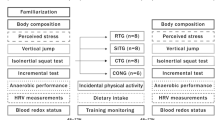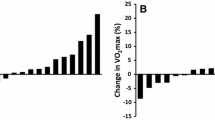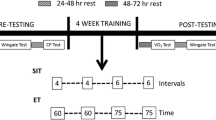Abstract
Background
This study examined the effects of a single all-out bout of 30-s sprint-cycle performed daily for 5 consecutive days per week for 6 weeks, on aerobic fitness, muscle strength and metabolic-health markers in physically active young males and females.
Methods
Healthy, physically active 20–28 year olds, were randomly assigned to either experimental (EXP, N = 11) or non-training control (CON, N = 8) group. With supervision, the EXP group performed one bout of 30-s sprint-cycle daily, Mondays to Fridays over 6 weeks, while CON group continued with their usual lifestyle. The followings were measured at pre- and post-intervention: maximal aerobic power, peak torque of knee extensors and flexors at velocities 30° s−1 and 300° s−1, resting heart rate, resting blood pressure, body fat percentage, fasting lipid profile, fasting blood glucose, and fasting insulin levels.
Results
There were no significant improvements in the EXP group for all the measured variables (all P > 0.05); except for significant interaction effects in peak torque of knee extensors at 30° s−1 (P = 0.044) and low-density lipoprotein-cholesterol (P = 0.046). Post hoc test indicate that CON group showed decline in their low-density lipo-proteins levels (P = 0.024).
Conclusion
Six weeks of one all-out bout of 30-s sprint-cycle per day, for 5 consecutive days per week, was ineffective in improving cardiovascular fitness, maximal strength, and most health markers in physically active young adults. The present results when combined with the previous literature suggest that there is a possibility of a minimum threshold for a number of sprint-cycle bouts needed to be performed before any form of cardio-metabolic-health benefit is accrued.

Similar content being viewed by others
Data availability
Data for the above study is available upon reasonble request.
Abbreviations
- au:
-
Arbitrary unit
- BP:
-
Blood pressure
- CMT:
-
Continuous moderate-intensity training
- CON:
-
Control
- GLUT4:
-
Glucose transporter type 4
- EXP:
-
Experimental
- F :
-
Females
- HDL-C:
-
High-density lipid cholesterol
- HIIT:
-
High-intensity interval training
- HR:
-
Heart rate
- HRmax :
-
Maximum heart rate
- LDL-C:
-
Low-density lipid cholesterol
- M :
-
Males
- N :
-
Number of participants
- PAR-Q +:
-
Physical Activity Readiness Questionnaire
- rep:
-
Repetition(s)
- RPE:
-
Ratings of perceived exertion
- rpm:
-
Revolutions per minute
- SIT:
-
Sprint interval training
- TC:
-
Total cholesterol
- TE:
-
Technical error
- W:
-
Watt
- WAnT:
-
Wingate Anaerobic cycle Test
- VO2max:
-
Maximal oxygen uptake
References
Allison MK, Baglole JH, Martin BJ, Macinnis MJ, Gurd BJ, Gibala MJ (2017) Brief intense stair climbing improves cardiorespiratory fitness. Med Sci Sports Exerc 49(2):298–307. https://doi.org/10.1249/MSS.0000000000001188
Astorino TA, Causer E, Hazell TJ, Arhen BB, Gurd BJ (2022) Change in central cardiovascular function in response to intense interval training: a systematic review and meta-analysis. Med Sci Sports Exerc 54(12):1991–2004. https://doi.org/10.1249/MSS.0000000000002993
Bagley L, Al-Shanti N, Bradburn S, Baig O, Slevin M, McPhee JS (2021) Sex comparison of knee extensor size, strength and fatigue adaptation to sprint interval training. J Strength Cond Res 35(1):64–71. https://doi.org/10.1519/JSC.0000000000002496
Blackwell JEM, Doleman B, Herrod PJJ, Ricketts S, Phillips BE, Lund JN, Williams JP (2018) Short-term (<8 wk) high-intensity interval training in diseased cohorts. Med Sci Sports Exerc 50(9):1740–1749. https://doi.org/10.1249/MSS.0000000000001634
Bogdanis GC, Nevill ME, Boobis LH, Lakomy HK (1996) Contribution of phosphocreatine and aerobic metabolism to energy supply during repeated sprint exercise. J Appl Physiol 80(3):876–884. https://doi.org/10.1152/jappl.1996.80.3.876
Burgomaster KA, Hughes SC, Heigenhauser GJ, Bradwell SN, Gibala MJ (2005) Six sessions of sprint interval training increases muscle oxidative potential and cycle endurance capacity in humans. J Appl Physiol 98(6):1985–1990. https://doi.org/10.1152/japplphysiol.01095.2004
Burgomaster KA, Howarth KR, Phillips SM, Rakobowchuk M, Macdonald MJ, McGee SL et al (2008) Similar metabolic adaptations during exercise after low volume sprint interval and traditional endurance training in humans. J Physiol 586(1):151–160. https://doi.org/10.1113/jphysiol.2007.142109
Derave W, Hansen BF, Lund S, Kristiansen S, Richter EA (2000) Muscle glycogen content affects insulin-stimulated glucose transport and protein kinase B activity. Am J Physiol Endocrinol Metab 279(5):E947–E955. https://doi.org/10.1152/ajpendo.2000.279.5.E947
Driller MW, Argus CK, Shing CM (2013) The reliability of a 30-s sprint test on the Wattbike cycle ergometer. Int J Sports Physiol Perform 8:379–383. https://doi.org/10.1123/ijspp.8.4.379
Esbjornsson-Liljedahl M, Bodin K, Jansson E (2002) Smaller muscle ATP reduction in women than in men by repeated bouts of sprint exercise. J Appl Physiol 93(3):1075–1083. https://doi.org/10.1152/japplphysiol.00732.1999
Gibala MJ, Little JP, MacDonald MJ, Hawley JA (2012) Physiological adaptations to low-volume, high-intensity interval training in health and disease. J Physiol 590(5):1077–1084. https://doi.org/10.1113/jphysiol.2011.224725
Gillen J, Percival M, Skelly L, Martin B, Tan R, Tarnopolsky M et al (2014) Three minutes of all-out intermittent exercise per week increases skeletal muscle oxidative capacity and improves cardiometabolic health. PLoS ONE 9(11):e111489. https://doi.org/10.1371/journal.pone.0111489
Gillen JB, Martin BJ, MacInnis MJ, Skelly LE, Tarnopolsky MA, Gibala MJ (2016) Twelve weeks of sprint interval training improves indices of cardiometabolic health similar to traditional endurance training despite a five-fold lower exercise volume and time commitment. PLoS ONE 11(4):e0154075. https://doi.org/10.1371/journal.pone.0154075
Haines M, Broom D, Gillibrand W, Stephenson J (2020) Effects of three low volume, high-intensity exercise conditions on affective valence. J Sports Sci 38(2):121–129. https://doi.org/10.1080/02640414.2019.1684779
Hall AJ, Aspe RR, Craig TP, Kavaliauskas M, Babraj J, Swinton PA (2023) The effects of sprint interval training on physical performance: a systematic review and meta-analysis. J Strength Cond Res 37(2):457–481. https://doi.org/10.1519/JSC.0000000000004257
Ho BH, Lim I, Tian R, Tan F, Aziz AR (2018) Effects of a novel exercise training protocol of Wingate-based sprint bouts dispersed over a day on selected cardiometabolic health markers in sedentary females: a pilot study. BMJ Open Sport Exerc Med 4(1):e000349. https://doi.org/10.1136/bmjsem-2018-000349
Jenkins EM, Nairn LN, Skelly LE, Little JP, Gibala MJ (2019) Do stair climbing exercise “snacks” improve cardiorespiratory fitness? Appl Physiol Nutr Metab 44(6):681–684. https://doi.org/10.1139/apnm-2018-0675
Kodama S, Saito K, Tanaka S, Maki M, Yachi Y, Asumi M et al (2009) Cardiorespiratory fitness as a quantitative predictor of all-cause mortality and cardiovascular events in healthy men and women a meta-analysis. J Am Med Assoc 301(19):2024–2035. https://doi.org/10.1001/jama.2009.681
Lacewell AN, Buck TM, Romero SA, Halliwill JR (2014) Postexercise syncope: Wingate syncope test and effective countermeasure. Exp Physiol 99(1):172–186. https://doi.org/10.1113/expphysiol.2013.075333
Lee I-M (2007) Dose-response relation between physical activity and fitness: even a little is good; more is better. J Am Med Assoc 297(19):2137–2139. https://doi.org/10.1001/jama.297.19.2137
Leu J, Rebello SA, Sargent GM, Kelly M, Banwell C (2023) Hard work, long hours, and Singaporean young adults’ health—a qualitative study. Front Public Health 11:1082581. https://doi.org/10.3389/fpubh.2023.1082581
Little JP, Langley J, Lee M, Myette-Côté E, Jackson G, Durrer C et al (2019) Sprint exercise snacks: a novel approach to increase aerobic fitness. Eur J Appl Physiol 119(5):1203–1212. https://doi.org/10.1007/s00421-019-04110-z
Lloria-Varella J, Koral J, Ravel A et al (2023) Neuromuscular and autonomic function is fully recovered within 24 h following a sprint interval training session. Eur J Appl Physiol 123:2317–2329. https://doi.org/10.1007/s00421-023-05249-6
Metcalfe RS, Babraj JA, Fawkner SG, Vollaard NB (2012) Towards the minimal amount of exercise for improving metabolic health: beneficial effects of reduced-exertion high-intensity interval training. Eur J Appl Physiol 112(7):2767–2775. https://doi.org/10.1007/s00421-011-2254-z
Metcalfe RS, Koumanov F, Ruffino J, Stokes KA, Holman GD, Thompson D et al (2015) Physiological and molecular responses to an acute bout of reduced-exertion high-intensity interval training (REHIT). Eur J Appl Physiol 115(11):2321–2334. https://doi.org/10.1007/s00421-015-3217-6
Metcalfe RS, Tardif N, Thompson D, Vollaard NB (2016) Changes in aerobic capacity and glycaemic control in response to reduced-exertion high-intensity interval training (REHIT) are not different between sedentary men and women. Appl Physiol Nutr Metab 41(11):1117–1123. https://doi.org/10.1139/apnm-2016-0253
Nalçakan GR (2014) The effects of sprint interval vs. continuous endurance training on physiological and metabolic adaptations in young healthy adults. J Hum Kinet 44:97–109. https://doi.org/10.2478/hukin-2014-0115
Nalçakan GR, Songsorn P, Fitzpatrick BL, Yüzbasioglu Y, Brick NE, Metcalfe RS, Vollaard NBJ (2018) Decreasing sprint duration from 20 to 10 s during reduced-exertion high-intensity interval training (REHIT) attenuates the increase in maximal aerobic capacity but has no effect on affective and perceptual responses. Appl Physiol Nutr Metab 43(4):338–344. https://doi.org/10.1139/apnm-2017-0597
Schlittler M, Neyroud D, Tanga C et al (2019) Three weeks of sprint interval training improved high-intensity cycling performance and limited ryanodine receptor modifications in recreationally active human subjects. Eur J Appl Physiol 119:1951–1958. https://doi.org/10.1007/s00421-019-04183-w
Seiler S, Jøranson K, Olesen BV, Hetlelid KJ (2013) Adaptations to aerobic interval training: interactive effects of exercise intensity and total work duration. Scand J Med Sci Sports 23(1):74–83. https://doi.org/10.1111/j.1600-0838.2011.01351.x
Songsorn P, Lambeth-Mansell A, Mair JL, Haggett M, Fitzpatrick BL, Ruffino J et al (2016) Exercise training comprising of single 20-s cycle sprints does not provide a sufficient stimulus for improving maximal aerobic capacity in sedentary individuals. Eur J Appl Physiol 116(8):1511–1517. https://doi.org/10.1007/s00421-016-3409-8
Songsorn P, Ruffino JS, Vollaard NB (2017) No effect of acute and chronic supramaximal exercise on circulating levels of the myokine SPARC. Eur J Sport Sci 17(4):447–452. https://doi.org/10.1080/17461391.2016.1266392
Thomas G, Songsorn P, Gorman A, Brackenridge B, Cullen T, Fitzpatrick B, Metcalfe RS, Vollaard NBJ (2020) Reducing training frequency from 3 or 4 sessions/week to 2 sessions/week does not attenuate improvements in maximal aerobic capacity with reduced-exertion high-intensity interval training (REHIT). Appl Physiol Nutr Metab 45(6):683–685. https://doi.org/10.1139/apnm-2019-0750
Thyfault J (2008) Setting the stage: possible mechanisms by which acute contraction restores insulin sensitivity in muscle. Am J Physiol Regul Integr Comp Physiol 294(4):R1103–R1110. https://doi.org/10.1152/ajpregu.00542.2007
Vollaard NBJ, Metcalfe RS (2017) Research into the health benefits of sprint interval training should focus on protocols with fewer and shorter sprints. Sports Med 47(12):2443–2451. https://doi.org/10.1007/s40279-017-0727-x
Wenger HA, Bell GJ (1986) The interactions of intensity, frequency and duration of exercise training in altering cardiorespiratory fitness. Sports Med 3(5):346–356. https://doi.org/10.2165/00007256-198603050-00004
Weston KS, Wisløff U, Coombes JS (2014) High-intensity interval training in patients with lifestyle-induced cardiometabolic disease: a systematic review and meta-analysis. Br J Sports Med 48:1227–1234. https://doi.org/10.1136/bjsports-2013-092576
Whyte L, Gill J, Cathcart A (2010) Effect of 2 weeks of sprint interval training on health-related outcomes in sedentary overweight/obese men. Metabolism 59(10):1421–1428. https://doi.org/10.1016/j.metabol.2010.01.002
World Health Organization (2020) WHO guidelines on physical activity and sedentary behaviour: at a glance. dlhttps://apps.who.int/iris/bitstream/handle/10665/337001/9789240014886-eng.pdf. Accessed 23 Jun 2023
Wun CH, Zhang MJ, Ho BH, McGeough K, Tan F, Aziz AR (2020) Efficacy of a six-week dispersed Wingate-cycle training protocol on peak aerobic power, leg strength, insulin sensitivity, blood lipids and quality of life in healthy adults. Int J Environ Res Public Health 17(13):4860. https://doi.org/10.3390/ijerph17134860
Funding
This research received no external funding.
Author information
Authors and Affiliations
Contributions
ARA conceived the study’s research question, aims and designed the study’s experimental protocols. PYW, SMMS, WJMC, MXCK, KMSC, HWDC, LJ, and SS contributed to recruitment of participants, access to facilities, and experiment equipping. PYW, SMMS, WJMC, MXCK, KMSC, and HWDC conducted the experiments and data collection. PYW, SMMS, WJMC, MXCK, KMSC, and HWDC helped to tabulate and collate the raw data. PYW and HWDC analyzed and interpreted the data. ARA prepared the initial draft of the manuscript. PYW, SMMS, WJMC, MXCK, KMSC, HWDC, LJ, and SS provided constructive feedback to the progress of the written manuscript. All authors read, reviewed, and approved the final version of the manuscript.
Corresponding author
Ethics declarations
Conflict of interest
All authors declared they have no competing interest as a result of the e publication of this manuscript.
Additional information
Communicated by Guido Ferretti.
Publisher's Note
Springer Nature remains neutral with regard to jurisdictional claims in published maps and institutional affiliations.
Rights and permissions
Springer Nature or its licensor (e.g. a society or other partner) holds exclusive rights to this article under a publishing agreement with the author(s) or other rightsholder(s); author self-archiving of the accepted manuscript version of this article is solely governed by the terms of such publishing agreement and applicable law.
About this article
Cite this article
Wong, P.Y., Soh, S.M.M., Chu, WJ.M. et al. A single all-out bout of 30-s sprint-cycle performed on 5 consecutive days per week over 6 weeks does not enhance cardiovascular fitness, maximal strength, and clinical health markers in physically active young adults. Eur J Appl Physiol (2024). https://doi.org/10.1007/s00421-023-05411-0
Received:
Accepted:
Published:
DOI: https://doi.org/10.1007/s00421-023-05411-0




